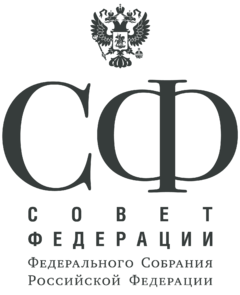Federation Council (Russia)
|
Federation Council Совет Федерации (Sovet Federatsii) |
|
|---|---|
| Federal Assembly of Russia | |
 |
|
| Type | |
| Type | |
| Leadership | |
|
Chairwoman
|
|
| Structure | |
| Seats | 170 |
 |
|
|
Political groups
|
Independent (170) (Officially) |
| Elections | |
| Chosen by territorial politicians | |
|
Last election
|
12 December 1993 |
|
Next election
|
none (chosen by federal subjects of Russia) |
| Meeting place | |
 |
|
| Website | |
| www.council.gov.ru | |
The Federation Council (Russian: Сове́т Федера́ции; Sovet Federatsii) is the upper house of the Federal Assembly of Russia (the parliament of the Russian Federation), according to the 1993 Constitution of the Russian Federation. Each of the 85federal subjects of Russia – consisting of 22 republics, 46 oblasts, nine krais, three federal cities, four autonomous okrugs, and one autonomous oblast – sends two senators to the Council, for a total membership of 170 Councillors.
The council holds its sessions within the Main Building on Bolshaya Dmitrovka Street in Moscow, the former home of the Soviet State Building Agency (Gosstroy), with further offices and committee rooms located on Novy Arbat Street. The two houses of the Federal Assembly are physically separated, with the State Duma residing in another part of Moscow. Sessions of the Federation Council are held in Moscow from January 25 to July 15, and from September 16 to December 31. Sessions are open to the public, although the location of sessions can be changed if the Federation Council so desires, and secure closed sessions may be convoked.
For purposes of succession, the chairman of the Federation Council is the third highest position, after the president and the prime minister. In the case of incapacity of the President and Prime Minister, the chairman of the Federation Council becomes Acting President of the Russian Federation.
...
Wikipedia
